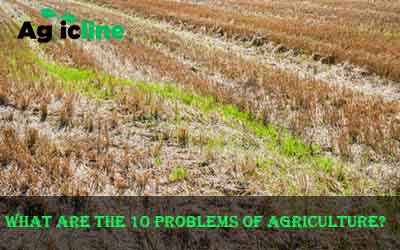Agriculture is not just a means of livelihood but the backbone of India’s economy, engaging over 58% of the country’s population and contributing significantly to its GDP.
Despite its central role, Indian agriculture is fraught with challenges that threaten the sustainability and productivity of this vital sector.
Understanding the Challenges Faced by Farmers in India, we look deep into the myriad issues Indian farmers face, from environmental adversities to economic and policy-induced hurdles.
Overview of Indian Agriculture
India’s agriculture is a testament to the resilience and perseverance of its farmers. With a history spanning thousands of years, it supports a nation of over 1.3 billion people, underscoring its importance.
However, beneath the surface of this green revolution lies a narrative of struggle and hardship faced by those who toil the land.
Recent statistics shed light on the magnitude of agriculture in India, revealing that it constitutes a significant part of the nation’s economy.
The journey of an Indian farmer is fraught with obstacles, starting from the sowing season to the market sale. Environmental challenges such as erratic rainfall, droughts, and floods directly impact crop yields and, consequently, the income stability of farmers.
Water scarcity and soil degradation, exacerbated by unsustainable farming practices, further complicate the agricultural landscape.
Economically, farmers grapple with the burden of debt due to high input costs and fluctuating market prices. The lack of fair pricing mechanisms and access to markets puts additional pressure on their financial stability.
Moreover, the technological and educational divide limits their ability to improve farming techniques and adopt modern practices that could enhance productivity and sustainability.
Policy and infrastructure challenges also play a significant role in shaping the agricultural environment. Inadequate support policies, coupled with poor infrastructure for storage, transportation, and logistics, hinder the growth and development of the sector.
Social issues, including health risks associated with farming and gender disparities, add another layer of complexity to the challenges faced by farmers.
Challenges faced by farmers in India
- Environmental Challenges
- Economic Challenges
- Technological and Educational Gaps
- Policy and Infrastructure Challenges
- Health and Social Issues
Environmental Challenges
The environmental challenges faced by farmers in India are both vast and varied, deeply impacting the productivity and sustainability of agricultural practices.
- Climate Change and Its Impacts
Climate change stands as one of the most formidable adversaries for Indian agriculture. Erratic weather patterns, including unseasonal rains, severe droughts, and catastrophic floods, have become more frequent and unpredictable.
These changes not only destroy crops but also disrupt the agricultural calendar, making it increasingly difficult for farmers to plan sowing and harvesting activities.
- Water Scarcity
Water scarcity has emerged as a critical environmental challenge, with many regions of India facing acute shortages.
The overexploitation of groundwater for irrigation, coupled with inefficient water use practices, has led to a drastic decline in water tables.
This scarcity is not just about the quantity of water available but also concerns the quality, as water sources become increasingly contaminated with agricultural runoff containing fertilizers and pesticides.
- Soil Degradation
The health of the soil is fundamental to agriculture, yet it is an aspect that is often neglected. Intensive farming practices, overuse of chemical fertilizers and pesticides, and inadequate crop rotation have led to significant soil degradation across India.
This degradation manifests in reduced fertility, increased erosion, and diminished water retention capacity, severely impacting crop yields.
Economic Challenges
The economic challenges confronting Indian farmers are as diverse as they are complex, deeply rooted in the very structure of the agricultural sector.
- Debt and Financial Instability
Debt is a pervasive issue within the agricultural sector, with many farmers relying on loans to purchase seeds, fertilizers, and equipment.
However, the unpredictable nature of farming, compounded by fluctuating market prices, often leaves farmers unable to repay these loans, trapping them in a cycle of debt.
The situation is exacerbated by the reliance on informal sources of credit, which charge exorbitant interest rates. This financial instability is a leading cause of distress within the farming community, sometimes with tragic outcomes.
- Market Access and Fair Pricing
Access to markets and the ability to secure fair prices for their produce are significant hurdles for many Indian farmers.
The traditional agricultural market system in India is riddled with intermediaries, which can dilute the farmers’ profits and leave them vulnerable to exploitation.

Technological and Educational Gaps
In the rapidly evolving world of agriculture, technological advancements and education play pivotal roles in enhancing productivity and sustainability.
- Lack of Access to Modern Technology
Despite the proven benefits of agricultural technologies such as precision farming, biotechnology, and digital platforms for market access, a large number of Indian farmers remain disconnected from these innovations.
The reasons for this disconnect are multifaceted, including the high cost of technology, lack of awareness, and inadequate infrastructure to support technological integration.
This gap not only hinders the efficiency and productivity of farming operations but also exacerbates the vulnerability of farmers to environmental and economic stresses.
- Educational and Training Opportunities
Education and training in modern agricultural practices are equally critical in empowering farmers to meet the challenges of the 21st century.
A significant portion of the farming community lacks access to formal agricultural education, limiting their ability to adopt innovative farming techniques and improve crop yields. This gap in knowledge and skills reinforces traditional practices that may not be sustainable or productive in the current context.
- Paving the Way Forward
The path to bridging the technological and educational gaps in Indian agriculture is fraught with challenges but is essential for the future prosperity of the sector.
By facilitating access to modern technologies and enhancing educational opportunities for farmers, India can unlock the full potential of its agricultural sector.
These efforts can lead to increased productivity, environmental sustainability, and economic stability for the farming community.
Policy and Infrastructure Challenges
The landscape of Indian agriculture is significantly influenced by policy and infrastructure, which are critical for providing the necessary support and framework for farmers to thrive.
- Government Policies and Support
Agricultural policies in India aim to support farmers through subsidies, minimum support prices (MSP) for certain crops, and various schemes intended to enhance productivity and income stability.
- Infrastructure and Logistics
The state of infrastructure related to agriculture in India—ranging from irrigation and storage facilities to transportation and market access—is critical yet often inadequate.
Inadequate storage facilities lead to post-harvest losses, while poor transportation infrastructure can limit access to markets, affecting the profitability of farming.
- Charting a Path Forward
The challenges posed by policy and infrastructure in Indian agriculture are daunting but not insurmountable.
Reforming agricultural policies to make them more adaptive and farmer-friendly, coupled with significant investments in infrastructure, can lay the foundation for a more productive and sustainable agricultural sector.
Health and Social Issues
Beyond the fields and markets, Indian farmers face a myriad of health and social challenges that affect their ability to farm productively and live fulfilling lives.
- Health Risks Associated with Farming
Farming is a physically demanding occupation that exposes workers to numerous health risks, including injuries from machinery and tools, exposure to harmful chemicals in pesticides and fertilizers, and the effects of extreme weather conditions.
The long-term health impacts of these exposures can be severe, leading to chronic illnesses and diseases. Moreover, the lack of access to healthcare and health education in rural areas exacerbates these risks, leaving many farmers without the necessary support to manage their health.
- Gender and Social Equity
The agricultural sector in India is also marked by significant gender and social inequities. Women, who constitute a substantial portion of the agricultural workforce, often face disparities in access to resources, training, and decision-making power.
Social hierarchies and caste dynamics further influence the distribution of agricultural benefits and opportunities, sometimes marginalizing smallholder and tenant farmers.
Efforts to promote gender and social equity in agriculture are vital. Empowering women with equal access to land, credit, and information can lead to improved productivity and economic outcomes.
- Mental Health
The mental health of farmers is an issue of growing concern, with stressors such as financial instability, climate change, and social pressures contributing to high levels of anxiety and depression among the farming community.
The stigma surrounding mental health, coupled with limited access to mental health services in rural areas, makes it difficult for those in need to seek help.
Creating support systems for the mental well-being of farmers is critical. This can include community-based mental health programs, stress management training, and initiatives that promote social solidarity among farmers.
Conclusion on the challenges faced by farmers in India
The different challenges faced by farmers in India ranging from environmental hurdles, economic constraints, technological and educational gaps, policy and infrastructure inadequacies, to health and social issues—paint a complex picture of the agricultural sector.
Each challenge, with its unique dimensions, contributes to the difficulties faced by the farming community, impacting their livelihoods, productivity, and overall well-being.
Identification of these problems will give a better room for understanding and clever approach to solving them.
Recommendations
8 Difference between gardening and farming
How to Start An Animal farm business in Nigeria
Does companion planting tomatoes and cucumbers work?



